Rye Barcott's Blog, page 23
October 30, 2012
Talent exposure at Trade Show
The Nairobi International Trade Show, Kenya’s largest exhibition that brings together entrepreneurs and innovation from across the globe, took place October 1st through October 7th, and some select groups from CFK’s Taka Ni Pato program were chosen by the Ministry of Agriculture to showcase their products.
The Tie and Dye wo men’s group worked hard to prepare many materials and clothes for the show; they got together and spent an entire day, morning to evening, preparing and dying the materials into beautiful patterns and designs. They were able to showcase and sell their work at the show the next week. The women described this opportunity as a great way to broaden their network and for more people to learn about what they do. Thanks to CFK’s connection, they were able to get a spot at the show!
men’s group worked hard to prepare many materials and clothes for the show; they got together and spent an entire day, morning to evening, preparing and dying the materials into beautiful patterns and designs. They were able to showcase and sell their work at the show the next week. The women described this opportunity as a great way to broaden their network and for more people to learn about what they do. Thanks to CFK’s connection, they were able to get a spot at the show!
The following groups were also chosen to showcase their work all together at the show: Zulu (a group making charcoal out of organic materials), Fruitful Women (a group making beautiful beaded jewelry to support an informal orphanage in Kibera), Victorious Youth Group (a group making jewelry out of animal bones) and Zero Waste (a group taking materials such as plastic bags and crocheting them into purses and other marketable items).
“We gave the youth and women an opportunity to expose their commodities to other people of Kenya and make them realize the hidden talents in Kibera and widen the market for their products,” remarked Medina Abakar, Taka Ni Pato Program Officer.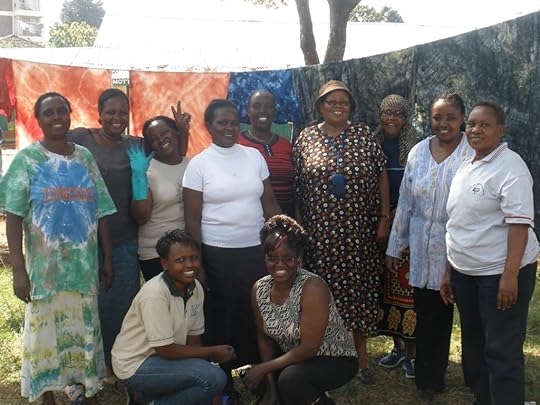
Overall, most of the groups were able to sell a significantly larger number of items than they would in a typical work week. Additionally, all of the groups experienced great exposure to the public eye; people from all around Nairobi and Kenya came to the show.
August 17, 2012
Fueling Kibera
Takachar: Partnership with MIT students holds promise for healthy, affordable, sustainable fuel in Kibera
by Jeffrey Okoro, Administrative Assistant
“Takachar” is combination of Swahili and English words. Taka is a Swahili word meaning waste and Char, a solid material that is left after a process of pyrolysis. This summer a group of four students, representing a larger team from MIT called Takachar, have set up camp in Kibera. Partnering with CFK, the team’s goal is to design and test the viability of an alternative fuel source to charcoal that will use locally available organic waste, convert it to charcoal, and provide cheaper cooking fuel for residents of Kibera. The idea started when Kevin Kung, founder of Takachar, saw the untapped potential of household and market waste while traveling in Uganda and Kenya.

Charcoal is currently the primary cooking fuel in Kibera, with about 65% of the population using it as their primary cooking fuel. In Kibera charcoal consumption is estimated to be about 200 tons/day—that is about 200 trees cut down every day! On the household level, charcoal is also quite costly. The average household spends about 45% of their income on cooking fuel. Individually, income is roughly $2/day (although it’s often unreliable day to day) and the amount spent on charcoal in a day is from $0.50 upwards – about 25% of daily income! To make matters worse, the price of charcoal in Kibera has risen about 40% in the last year. In addition, emissions in the form of particulate matter and carbon monoxide, among other things, are very hazardous to health. Such heavy reliance and demand for charcoal, also found throughout the rest of country, contributes to deforestation in Kenya’s rural areas and to global warming by emission of CO2.
The problems of waste management and the heavy reliance on wood charcoal is proving catastrophic to the environment – and Takachar is wholly dedicated to finding a solution that benefits both individuals and the larger community. Earlier this year, Takachar won the Muhammad Yunus Innovation Challenge, making this summer’s pilot project in Kibera possible. With the help of CFK, they have partnered up with a waste sorting youth group—the Zulu Youth—and have been working on creating an appropriate new briquette using waste collected in Kibera.
Working in line with the CFK mission, Takachar is working to catalyze positive change by minimizing adverse side effects to health, managing household organic waste, providing a sustainable alternative fuel that will not damage the environment, and creating income generation opportunities for waste collection groups in Kibera.
Follow Takachar’s progress on their blog: http://takachar.blogspot.com/
July 31, 2012
A new tool for fitness in Kibera
by Molly Smith, 2012 CFK Fellow, Masters Student at UNC’s Department of Exercise and Sport Science
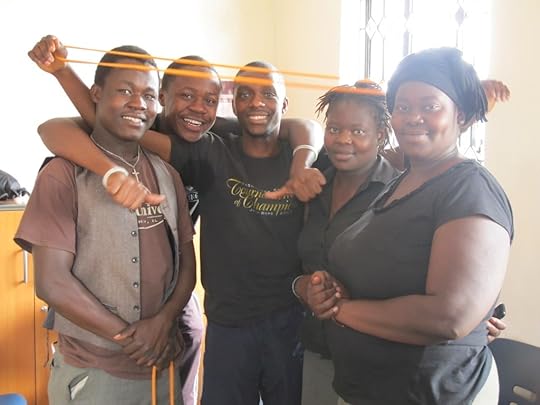
This weekend marked a new level of new partnership between CFK and the Durham, NC based company Rubberbanditz. As an athletic trainer studying in UNC’s Exercise and Sports Science department, I was excited to use the skills I have learned in school to train CFK members in the basics of exercise, anatomy, and strength training as they embark on a two month training program designed to produce certified Rubberbanditz trainers. The participants began the training with a wide range of fitness experiences; some are football (soccer) or jump rope coaches, one owns a local gym, and others have previously used Rubberbanditz for exercise. Some have little experience with exercise but are excited to get involved. To start the training, participants shared their goals ranging from wanting to become more fit and to learn to be personal trainers to wanting to empower the community and be role models in Kibera. When I first displayed the bands, there were some skeptical looks, especially by guys used to working out with heavy dumbbells. But by the end of Day 1, everyone experience firsthand the power of the bands and mastered the basic exercises. I think there will definitely be some sore muscles in the weeks ahead and that no one will doubt the difficulty of the bands in the future!
To learn more about the partnership between Rubberbanditz and CFK, check out this article in the Durham Herald Sun: http://heraldsun.com/view/full_story/19129410/article-Rubberbanditz-owner-sees-products-as-possible-job-creation-tool


July 16, 2012
Reflection on my visit to the U.S.
by CFK Staff Member, Ben Haggai 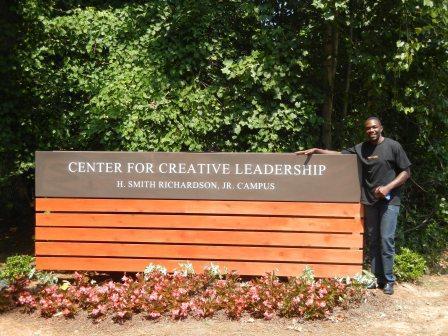
Before I boarded a plane to take me from Nairobi to the U.S.A, the furthest I had ever travelled was 1600 km during a college trip from Eldoret to Tsavo National Park. The opportunity to travel to the U.S. gave me a new experience, travelling over 100,000 km and soaring 35,000 feet above the ground. It was a long and interesting journey where I had to be stationary in a seated position for 19-20hrs, apart from the connection at London’s Heathrow Airport.
For me, I approached the trip with a strong conviction to have an open mind in order to explore all the opportunities that came throughout the trip. Among many experiences, I was honored to be a part of a panel discussion at the prestigious Woodrow Wilson International Center for Scholars in Washington, DC, to meet with our partners at the Center for Creative Leadership in Greensboro, NC, and talk with the founder of Rubberbanditz about social entrepreneurship and fitness in Durham,NC. I attended a Population Action meeting on family planning and was pleased to reunite with a friend I met three years ago in Kibera, a visit which reminded me of our walk and chat during his visit. I met with representatives from Planned Parenthood Federation of America (PPFA), made presentations to their staff and partners, and enjoyed a lunch break walk with staff members during a visit to their NYC office. Participating in advocacy and informing people about CFKs work from a grassroots perspective was fascinating and challenging. I was also surprised to learn how hard it is to get an appointment with a Congressperson or staff member, since my hosts arranged for four meetings at US government offices including a Legislative Aides, Staff Director to the Ranking Member of the House of Representatives Foreign Affairs Subcommittee on Africa, Global Health and Human Rights, and a Representative of the State Department’s Kenya Desk. Each of these visits helped me understand the essence of democracy and right to access elected and other government officials.
After days of high profile meetings in DC and NYC, I travelled to CFK’s headquarters in Chapel Hill, NC. It was nice to see the zeal and leadership nurtured in young kids at the Bouncing Bulldogs jump rope training center with their dedicated Coach Fredrick. Another encouraging aspect was the interactions with three of Carolina for Kibera’s board members, Beth-Ann, Estaban and Amon, where I learned that their involvement is a personal decision to help support individuals far away from home, while they all personally are focused individuals with great ambitions. In general, I found the American people to be hospitable and accommodating. I had an opportunity to meet people that I never thought I’d meet – from current and prospective donors to partners and former CFK volunteers. I even had the pleasure of being and hosted by former CFK Intern Chelsea Whittle and CFK Executive Director CFK Leann Bankoski.
My trip ended with the airplane touching down on home ground at the Jomo Kenyatta International Airport on 21st June, 2012, after two weeks of time well spent and resources well invested.
July 11, 2012
Meet Laurine and John
It’s been 6 months since we lost our dear friend and board member, Dr. Alan Cross. Our board meeting in April just wasn’t the same without his insightful wisdom and humor. As we continue our work in Kibera, it has been an honor to launch this scholarship in his memory.
Over the last few months, our team worked to set up the scholarship’s criteria and selection process. After much deliberation, I’m pleased to announce that they have selected two recipients: John Antony Mwaura, 21 and Laurine Oloo Otawa, 27. Both John and Laurine have a passion to pursue a career in healthcare. John aspires to be a clinical officer and Laurine wants to work in health records and information science. Both are actively involved with Carolina for Kibera, come highly recommended by those at CFK working alongside them, and have completed secondary school (high school) with good grades. Despite the pressure to provide for their families that often obstructs dreams of a higher education, John and Laurine believe that a degree will allow them to have a better career and through it, they can help both their family and the Kibera community.John and Laurine will begin their studies in September.
If you’d like to support the Alan Cross Memorial Scholarship, we welcome you to donate online here.
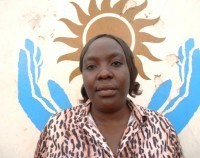 Laurine Oloo Otawa, 27, works at Tabitha Clinic on casual basis as the Janitor, earning a modest salary. For the past 2 years, she has been working at the clinic on a casual basis, cleaning and making tea for the clinic staff. Laurine lives in Kibera with her husband and two children. Her family has struggled with economic hardships for years. Laurine’s parents are unemployed, so Laurine was fortunate to be the only one to complete secondary education. Her four siblings all dropped out of school early because her parents couldn’t afford to pay school fees for all of their children.
Laurine Oloo Otawa, 27, works at Tabitha Clinic on casual basis as the Janitor, earning a modest salary. For the past 2 years, she has been working at the clinic on a casual basis, cleaning and making tea for the clinic staff. Laurine lives in Kibera with her husband and two children. Her family has struggled with economic hardships for years. Laurine’s parents are unemployed, so Laurine was fortunate to be the only one to complete secondary education. Her four siblings all dropped out of school early because her parents couldn’t afford to pay school fees for all of their children.
Laurine and her family have had a lot to cope with in the past few years – like poverty and pressure from friends who have continued their education. Though Laurine left primary school with above average grades and completed her secondary education in 2003 with grades good enough to qualify her to join any government university, she could not pursue a degree because of the cost. Instead, she got married and began looking for small jobs to provide an income for her family.
Though Laurine has been out of school for 9 years, she has been yearning to do a Bachelor of Science in Health Records and Information Science and is committed to going back to advance her education. Professionally, she aims to bridge the gap in the record keeping in health institutions. In her past two years in working at the Tabitha Clinic, she has observed first-hand the gap in the records sector. She says she has been inspired by the work and would like to make a contribution towards health, however small it is. Laurine is motivated to give back to her community, especially young people. She wants encourage youth in Kibera not to give up. She wants to show them that there are opportunities out there and they can become whatever they dream. For many years, Laurine has been torn between wanting to attend college and providing for her family. She hopes to finish college so she can help both her family and the youth in Kibera rise out of poverty.
Mark Muasa, Tabitha Clinic Manager, thinks highly of Laurine saying, “Laurine comes to work every day and has very good behavior. Despite her good academic scores, she has been humble to serve as a janitor-work that most young people would shy from. She loves coming to the clinic to do her work and takes up more responsibilities assigned. Her humility, willingness to learn about health related issues at work, support to patients, and determination to pursue her career has been outstanding. Indeed, she is a strong candidate to support so she can pursue her career.”
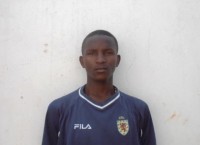 John Antony Mwaura, 21, has been an active participant in Carolina for Kibera (CFK)’s Sports Association for the past 7 years as a peer educator for life skills workshops. John has four siblings and lives with his single mother. To provide for the family, his mother does casual jobs in neighboring areas of washing clothes and cleaning houses. She earns a meager income to sustain the family.
John Antony Mwaura, 21, has been an active participant in Carolina for Kibera (CFK)’s Sports Association for the past 7 years as a peer educator for life skills workshops. John has four siblings and lives with his single mother. To provide for the family, his mother does casual jobs in neighboring areas of washing clothes and cleaning houses. She earns a meager income to sustain the family.
John has lived in Kibera since his birth in 1991. During the post-election violence in 2007/8, the family was forced to leave Kibera. What little property they had was burnt and they became internally displaced (IDPs). After some time they received some support and are now resettled on the outskirts of Kibera. Despite the difficulties of John’s family being displaced, he remained active with the Sports program continuously.
John’s academic career has been marked with difficulty – both academically and financially. As a young student, he moved from school to school because of his family’s inability to consistently pay his school fees. As a result, John was often out of school looking for casual part-time jobs, like day laborer work on construction sites to earn money to pay his school fees and provide food for his family. But John was persistent and at the age of 16, he completed his Kenya Certificate of Primary Education (KCPE) exam.
John then went on to complete secondary school. Considering his ongoing financial strains and the average academic reputation of the school, this is a decent score. His grades allowed him admission to a public or private university for a degree course (bachelor’s equivalent), but to date John has been unable to continue with his post-secondary education because of outstanding fees and the relatively high cost of degree programs.
John credits CFK’s Sports Association with helping him learn life skills like leadership, budgeting, and sexual health. He says that those skills have given him hope and motivated him to complete school. John now helps run the life skills trainings and serves as a mentor for younger players. Aside from his academic pursuits, John is active in various forms of community service. He participates in tree planting activities and community trash clean-ups, and visits the home-bound sick in Kibera.
Professionally, John wants to become a medical clinician so he can help his family and to improve his community’s situation by helping needy people. He says he would like to improve the health care and education systems in slums because slum dwellers worry about the situation daily and they are hoping for change. John says his passion to pursue a career in health is because of the empathy and compassion he has for the sick. He began choosing health related courses while he was in high school to help pursue his ambition to work in a health field. John is determined to do a diploma course in Clinical Health/Medicine so he can become a Clinical Officer (CO). A CO is a mid-level health personnel who offers various medical services-curative, preventive and rehabilitative services to patients. Clinical Officers supplement the work of medical doctors at all levels of healthcare either in hospitals, clinics or even teaching. John will join the Kenya Medical Training College (KMTC), a medical and reputable government training college, in September. KMTC has more than 50 medical courses, making it the biggest single contribution to the health sector in Kenya.
June 22, 2012
SRH Program – Developing Leaders, Improving Health
By Molly Smith and Kathleen Ellison, CFK Summer Fellows
CFK’s Sexual Reproductive Health (SRH) program is more than an educational outreach project designed to promote positive behavior and increase knowledge of HIV/AIDS and reproductive health. It is also a chance for passionate youth from Kibera to become Peer Youth Providers (YPPs), to serve as leaders within their communities, and to facilitate behavioral changes among their peers. We had the pleasure of meeting a few of these youth and hearing about how the YPP program has impacted their lives. Wilson shared how he sees the YPP program as an opportunity to help Kibera become a more accepting place to live. Victor expressed his excitement to teach his friends and neighbors about healthy behaviors. Sharon voiced concerns about insecurities and low self-esteem among Kibera youth, and said that being a YPP has increased her independence and self-confidence greatly. Erik, as a more experienced YPP, has served as a mentor to both Wilson and Victor, and spoke about how being a YPP has opened up educational doors for him. See his response in the video below.
March 26, 2012
Jump Rope: Empowering Youth and Nurturing Talent
By Norbert Aluku, Partnerships Manager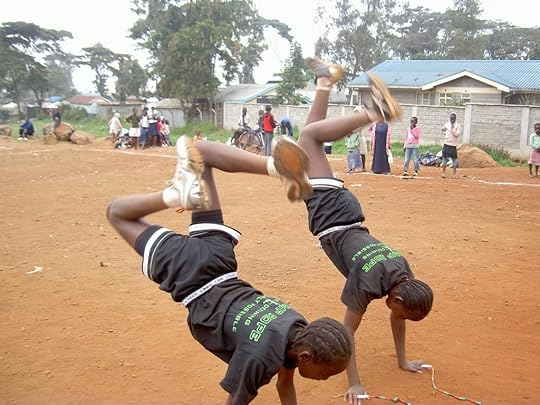
Many youth living in the terrible conditions of Kibera slums, especially girls, say they never knew they had a talent until they were introduced to jump rope. This is a sport many youth cherish in Kibera as it helps them realize the unique talent in them. Through Carolina for Kibera, the jump rope initiative now accommodates both boys and girls, aged 8 to 15 years. Through the sport, some say they now see how they can utilize the opportunity and transform the society they stay in. Christine Ondiek, a 14 year old living in Kibera notes with a gleam in her eyes, "I never knew I was blessed with an awesome talent of skipping this simple string. Whenever I perform publicly, the crowd remains dumbfounded and this makes me feel like a champion. I plan to break the world record in due time."
The Jump Rope team has managed to win several medals in East African Regional competitions held in the neighboring country of Tanzania and in the coastal province of Kenya. Christine states that jump rope has exposed her and she has learned new skills that she would love to share with her peers in the community.
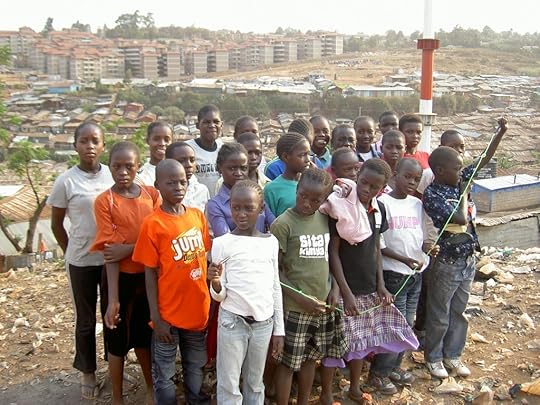 The three coaches for the program are all local youth volunteers. Amon, Davy and Innocent first came to work with CFK through the Sports Association. They now are leading the jump rope efforts and helping younger youth develop their talents. They realize that most of teens do not know how to tap their talents and now they are out to help them appreciate what they own. The CFK Paka Skippers, as they are called, use jump rope to not only develop their talents, but it has deterred them from negative peer pressure, boost their self-esteem, physical fitness and confidence.
The three coaches for the program are all local youth volunteers. Amon, Davy and Innocent first came to work with CFK through the Sports Association. They now are leading the jump rope efforts and helping younger youth develop their talents. They realize that most of teens do not know how to tap their talents and now they are out to help them appreciate what they own. The CFK Paka Skippers, as they are called, use jump rope to not only develop their talents, but it has deterred them from negative peer pressure, boost their self-esteem, physical fitness and confidence.
March 22, 2012
Health Relief in Kibera
Health Relief in Kibera by Kibera World Wide
When you hear the word 'health', what comes to your mind? Mostly maybe, is the fact that everyone has a right to good, affordable health care privileges, right?
In Kibera slums, a densely populated community where the majority is surviving on less than a dollar daily, having enough quality medical care to serve its residents is a major problem. With this kind of congestion and environment because of the density, the locals are subjected to a health threat related quagmire.
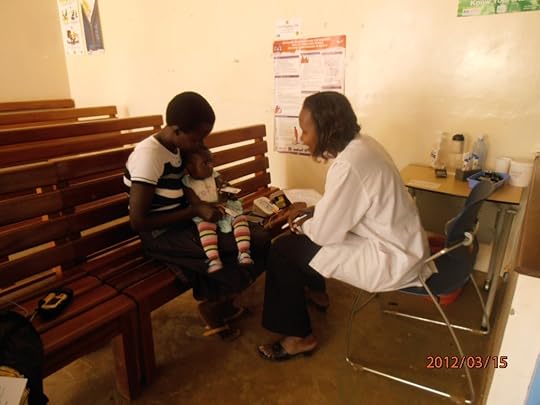 But all is not lost. Carolina for Kibera (CFK) with the partnership of the US Centers for Disease Control and Prevention (CDC), deeply felt what the Kibera community was going through and started a medical clinic. Tabitha Medical Clinic situated in Kibera at Gatwekera village serves a huge number of desperate children, men and women in this marginalized region. Someone may be shocked seeing patients rapidly increase in the facility as others queue in the waiting area for the high quality services from the dedicated medics.
But all is not lost. Carolina for Kibera (CFK) with the partnership of the US Centers for Disease Control and Prevention (CDC), deeply felt what the Kibera community was going through and started a medical clinic. Tabitha Medical Clinic situated in Kibera at Gatwekera village serves a huge number of desperate children, men and women in this marginalized region. Someone may be shocked seeing patients rapidly increase in the facility as others queue in the waiting area for the high quality services from the dedicated medics.
Speaking to the Kibera World Wide (KWW) team, the Interim Executive Director of CFK Mr. Hillary Omala said that the facility was started due to the scarcity of better health care services experienced by the residents of Kibera. "We are in a place where people really require quality health care services and that is what we are offering to the locals," said Mr. Omala. He added that in emergency situations, CFK also covers some patient's hospital expenses and medical bills.
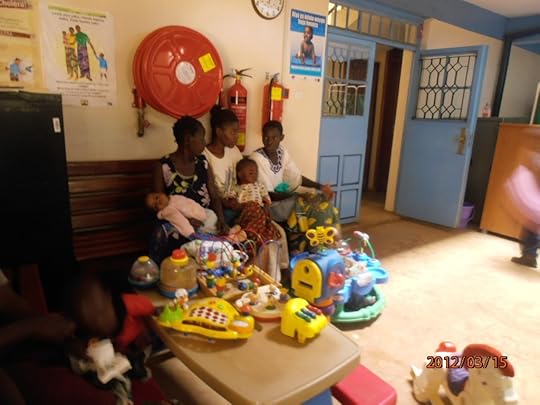 The Tabitha Medical Clinic, which serves several thousand people monthly, offers quality and affordable health services to the community members. Speaking to KWW the Clinic Manager Mr. Mark Muasa said the residents are responding positively towards the services offered in the clinic. "Our doctors and nurses are dedicated to their work and they even conduct one on one sessions to achieve the health needs in Kibera slums," noted Mr. Muasa. The two partners, CFK and CDC, are focused to ensure that Kibera society gets the best medical care. Not only do they emphasize curing illness, but they also deal with diseases that can be prevented like malaria.
The Tabitha Medical Clinic, which serves several thousand people monthly, offers quality and affordable health services to the community members. Speaking to KWW the Clinic Manager Mr. Mark Muasa said the residents are responding positively towards the services offered in the clinic. "Our doctors and nurses are dedicated to their work and they even conduct one on one sessions to achieve the health needs in Kibera slums," noted Mr. Muasa. The two partners, CFK and CDC, are focused to ensure that Kibera society gets the best medical care. Not only do they emphasize curing illness, but they also deal with diseases that can be prevented like malaria.
A client at the clinic, Ms. Abwala, shares how staff handle them with a lot of love and offer quality health care to them. "I prefer Tabitha Clinic since they understand the situation on the ground and services offered are superb."
November 14, 2011
NTV Kenya features Trash is Cash program
"Waste is not waste until it's wasted." This theme guides the work of the members of our Trash is Cash program, who were featured this week in a story by NTV Kenya, one of Kenya's major TV stations.
October 20, 2011
Help in a time of need
By Kibera Worldwide member Erick Owenga:
Olympic, where the CFK office is located, is buzzing with activities.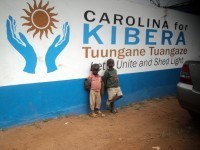 It's around 1:30pm and staff members have just finished attending their monthly meeting at the hall. Two brothers, after playing along the path next to the CFK main office, find themselves inside the compound to be given first aid. Brought in by the guard, Kepha Moses was handed to jump rope coach David Okoth for first aid assistance. The guard reports that he was doing somersaults and hit his head on the ground accidentally.
It's around 1:30pm and staff members have just finished attending their monthly meeting at the hall. Two brothers, after playing along the path next to the CFK main office, find themselves inside the compound to be given first aid. Brought in by the guard, Kepha Moses was handed to jump rope coach David Okoth for first aid assistance. The guard reports that he was doing somersaults and hit his head on the ground accidentally.
Concerned about his welfare, Cathrine, a counselor in the health program, attended to the little boy by cleaning blood off his face. All this happened as the staff and interns had just finished their lunch and others were wrapping up their meeting.
Even though the boys came to the office because of an injury, they 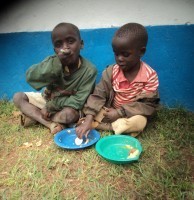 got lucky. Knowing that they were probably hungry, Edwin, the security guard, brought two plates of food for them. Kepha Moses, 5 years old, and his brother, Thomas Nyakundi, 6 years old, both sat on the ground and happily shared a plate of hot food.
got lucky. Knowing that they were probably hungry, Edwin, the security guard, brought two plates of food for them. Kepha Moses, 5 years old, and his brother, Thomas Nyakundi, 6 years old, both sat on the ground and happily shared a plate of hot food.
Their story is this: Kepha and Thomas both live in the slums of Kibera and come from a family of seven children. Because of hard economic times, their dad became unemployed and is forced to scout for a casual job while their mother is unable to provide meals for them or find work. As a result, she stays in the house most of the day.
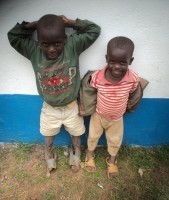 After enjoying their meal, Kepha and Thomas were in a noticeably more joyful mood and seemed much more energetic as well.
After enjoying their meal, Kepha and Thomas were in a noticeably more joyful mood and seemed much more energetic as well.
Personally, I view the whole event as a good contribution to these two young boys who would have otherwise spent an entire day on an empty stomach had they not showed up here at CFK, even if it was because of a bumped head. As the two depart, I can sense what is going through their minds about CFK. At the back of my mind, however, I am still left wondering what is in store for the other five needy siblings in their family?
Rye Barcott's Blog
- Rye Barcott's profile
- 7 followers



